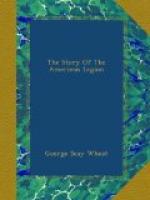This was unanimously agreed upon and the temporary committee elected Lt. Col. Roosevelt, temporary chairman, Lt. Col. Bennett C. Clark, temporary vice-chairman, Lt. Col. Wood, temporary secretary.
A sub-committee was appointed to receive from all the members of the temporary committee the names of such individuals of combat divisions and each section of the S.O.S. of the A.E.F., who were eligible and suitable to be delegates to a caucus scheduled for March 15th-16th-17th in Paris. A similar sub-committee was appointed to ascertain the names of men of the home forces in order that they might be urged to attend a caucus in America on or about May 8th-9th-10th.
The work of the sub-committee of the A.E.F. was much more difficult than would appear at first glance. It was easy enough to get the names of leaders in the various outfits, both of officers and men, but to get them to Paris! That was the job. Of course it was the ardent desire of everyone that the new organization should eventually become a society principally devoted to the interests of those who served as enlisted men, for they bore the brunt of the fighting and the work and were fundamentally responsible for the splendid victory.
But once the names of such men were in the committee’s hands the real work had not begun. There were mechanical difficulties in securing for enlisted men in active duty leave to attend a caucus in Paris. In the first place the enlisted men themselves, as indicated by several who were consulted, were very diffident about accepting an invitation to attend a caucus where they would be required to sit beside and debate with and against generals and field officers to whom they owed military obedience. Then again, there was the expense of travel in France, as well as the high cost of living in Paris. At the outset this raised the expense of a trip to the French capital to a sum amounting to many months of an enlisted man’s pay. Furthermore, the sub-committee was face to face with the A.E.F. regulations providing that except in the most unusual circumstances an enlisted man would not be granted leave except in company with a trainload of his fellows, and to a certain specified leave area.
But as has been said before the conclusion had been reached that if the organization was really to become preeminently an enlisted man’s outfit, it would be absolutely necessary to overcome these difficulties and by hook or crook to obtain the attendance of as many privates and noncommissioned officers as possible who were leaders. So, scarcely had seventeen of the twenty officers returned to their commands before they received an urgent appeal to help out the sub-committee of three. They were told to get enlisted delegates to Paris, never mind how, the method being of small importance provided the men were there.
CHAPTER II
THE PARIS CAUCUS, MARCH 15-17, 1919




